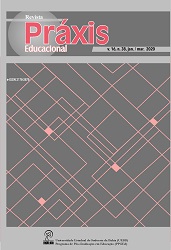EDUCATION IN AZERBAIJAN AS AN OBJECT OF STUDY IN LITERATURE
DOI:
https://doi.org/10.22481/praxisedu.v16i38.6011Keywords:
Education, Azerbaijan, School, LiteratureAbstract
In the XIX century Azerbaijanians in all Caucasus most densely lived in the Western Azerbaijan. The originality material and moral values, folklore literature, art of ashik (a singer of traditional songs), a mass school network, monuments of art, different architecture. At the same time, the Azerbaijanians living in the Western Azerbaijan were an example of preservation and enrichment of our literary language, our religion, our customs and traditions, mononational marriages. In the XIX century in Azerbaijan, in its Western part, school business and education developed. With opening of schools for row settlements of the country, along with national language, Russian studying didn't remain unaddressed also.
Downloads
Metrics
References
Akhmedov T., (1971) The drama of Nariman Narimanov, Baku, Science, (pp.272)
Ashish Joshi, Jane Meza, Sergio Costa, Douglas Marcel Puricelli Perin. The Role of Information and Communication Technology in Community Outreach, Academic and Research Collaboration, and Education and Support Services (IT-CARES) // Perspect Health Inf Manag. 2013 // https://www.ncbi.nlm.nih.gov/pmc/articles/PMC3797554
Ayyar, R.V.V. (1996). Educational policy planning and globalisation. International Journal of Educational Development, 16(4), 347-354.
Contemporary Azerbaijan in Social and Political Dimension (2016). Edited by Piotr Bajor. Kraków. - 126 p.
George T., (2003) Abed and Hamid R. Davoodi Challenges of Growth and Globalization in the Middle East and North Africa. International Monetary Fund 2003 // https://www.imf.org/external/pubs/ft/med/2003/eng/abed.htm
Green, A. (1999). Education and globalization in Europe and East Asia: onvergent and divergent trends. Journal of Education Policy, 14(1), 55-71.
Habibbeyli I., (1994) March, 4, № 10 the idea of in the school of Head Norashen // Literary newspaper.
Habibbeyli I., (2003) the master word of Mirza Celil Mammedquluzade //Mammedquluzade 7. Work Tom 1, Baku, Chinar, (pp. 464)
Hacıyev A., (1980) the climate of the literary of Tiflis, Baku, Yazichi, (pp.183)
Isaxanli H., (2014) History and Policy of Translating Poetry: Azerbaijan and Its Neighbors // Érudit Journals Meta, Volume 59, Number 2, August 2014, pp. 233-466
Ismayilova K., (1900) Selo Nehram //SMOMPK, Tiflis, №027 (pp.196)
Mammadli A., Allahyarova N., (2002), Mea Culpa The acknowledgement of Armenian elite Baku.
Mammadov I., (2008) Erevan copy book. Boring horizons in the history of the social thought, Baku, Abiloghli, (pp.216)
Mamedli P.H., (2015) Literature in Southern Azerbaijan. May - June 2015 // http://www.visions.az/en/news/655/8631a8e0/
Maud MTE Huynen, Pim Martens and Henk BM Hilderink (2005). The health impacts of globalisation: a conceptual framework Global Health. 2005; 1: 14. // https://www.ncbi.nlm.nih.gov/pmc/articles/PMC1208931
Seyid-zade D., (2010) Azerbaijan in the Beginning of XX century: Roads Leading to Independence. Baku 2010 OKA. 344 pp
The torch in the city of ignorance, (2006), Baku, Gismet, (pp.360)
The calendar of Caucasus Tbilisi (1886, 1899, 1900, 1901, 1903, 1907, 1908).
Vedibasar, (2008), April, 01-15, № 07 (pp.122),
Downloads
Published
How to Cite
Issue
Section
License
You are free to:
Share - copy and redistribute the material in any medium or format; Adapt - remix, transform, and build from the material for any purpose, even commercially. This license is acceptable for Free Cultural Works. The licensor cannot revoke these freedoms as long as you follow the terms of the license.
Under the following terms:
Attribution - You must appropriately give credit, provide a link to the license, and indicate if any changes have been made. You may do so in any reasonable way, but not in a way that suggests that you or your use is endorsed by the licensor.
There are no additional restrictions - You cannot apply legal terms or technological measures that legally restrict others to make any use permitted by the license.










